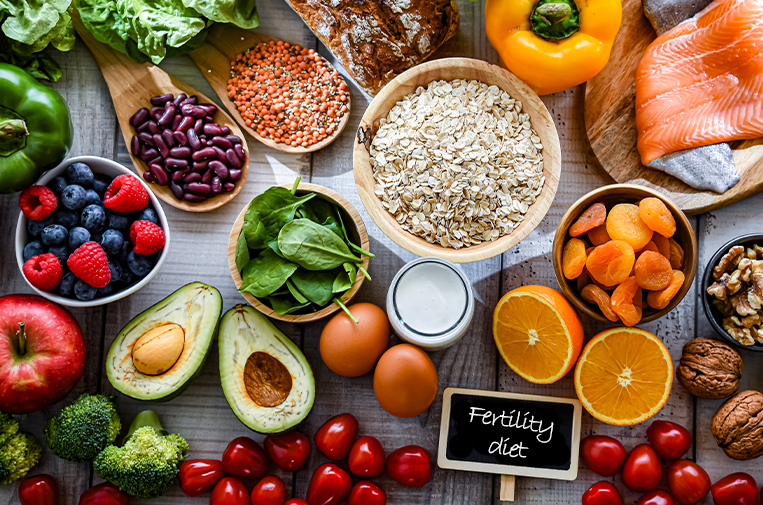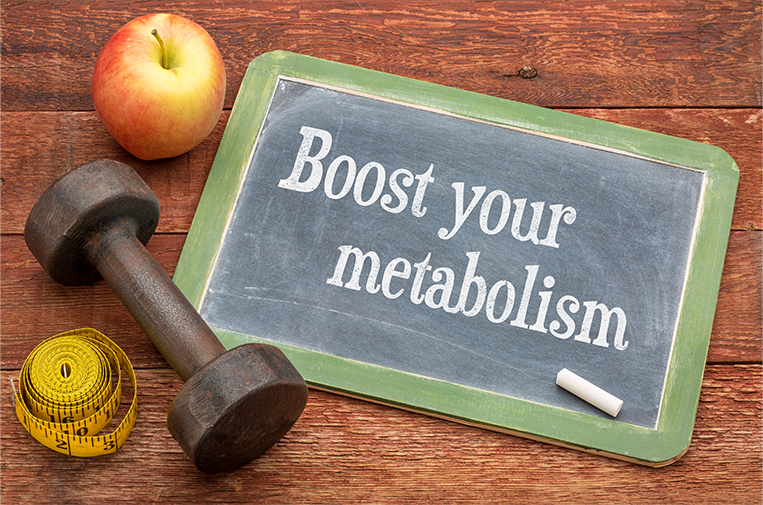From what to avoid (like complex carbohydrates) to what to eat (like healthy fats), following a fertility-enhancing diet is a wise recipe for pregnancy
Ensuring that you have a proper diet and take appropriate supplements can improve your fertility. While there is no single, ideal diet for everyone trying to improve their fertility, numerous studies indicate that a healthy, balanced diet can increase the chances for healthy ovulation, improved egg and sperm quality, prevention of recurrent miscarriage, and a healthy pregnancy.
The goal of a healthy diet is to bring the body back into balance for optimal functioning. Your clinical team may make individual recommendations specific to your unique fertility concerns. Please feel free to discuss any diet or supplement concerns with your physician or case manager.
To increase fertility and improve egg and sperm quality, we recommend a balanced macrobiotic diet rich in nutrients. This diet consists mostly of fresh organic vegetables and fruit, fibrous whole grains, complex carbohydrates, healthy protein and fats, and low-sugar foods. Supplementing your diet with essential vitamins and minerals will also strengthen your reproductive health.
Fertility enhancing diet: foods to eat and why
Organic fruits and vegetables
Fruits and vegetables supply the body with essential minerals, vitamins, enzymes, antioxidants, and water. Choose organically grown fruits and vegetables free of harmful pesticides and chemicals. Choose a wide variety of colors to get as many different nutrients as needed.
- Best fruits are red and purple berries, citrus, figs, grapes, melon, pears, pineapples, apples, pomegranates, and apricots.
- Best vegetables are asparagus, beans, beets, broccoli, brussels sprouts, cabbage, cauliflower, celery, corn, cucumber, fennel, garlic, greens/lettuce, leeks, okra, onions, parsnips, peas, radishes, rutabagas, sprouted seeds, squashes, sweet basil, sweet potatoes, thyme, turnips, watercress, and yams.
Fibrous whole grains and complex carbohydrates
Foods that contain the entire kernel or grain are beneficial to your health by supporting your immune system and keeping blood sugar balanced. They contain more protein and fiber and sustain energy longer.
- Grains include millet, quinoa, spelt, brown rice, buckwheat, amaranth, kasha/buckwheat, oatmeal, barley, whole rye, and cornmeal. It’s best to maximize non-gluten grains like millet, quinoa, and buckwheat for overall health. Also, the more fiber you eat, the better.
- Other high-fiber foods include broccoli, celery, apples, dark leafy greens, peas and beans, red and purple berries, garlic, parsley, fennel, cabbage, cauliflower, nuts and seeds, carrots, rhubarb, and sage.
Foods with protein
Consume equal amounts of protein and carbohydrates in each meal to balance sugar and insulin levels and sustain energy. Strive for mostly plant-based sources of protein and limit animal-based sources of proteins.
- Beans are a great vegetarian protein and include varieties like black, white, pinto, navy, garbanzo, lima, adzuki, lentils, etc.
- Nuts and seeds including walnuts, almonds, Brazil nuts, cashews, pumpkin seeds, chia seeds, sesame seeds, sunflower seeds, flax seeds, etc. are also a great plant-sourced protein.
- Organic fish that is wild-caught, not farm-raised or with added coloring, and comes from clean water sources free from pesticides and chemicals is another good source of protein. The most beneficial fish species are those that contain higher amounts of omega-3 fatty acid, which helps boost the immune system and aids in hormonal balance. These include salmon, herring, mackerel, sardines, trout and tuna. Note: limit your tuna intake, as it is higher in harmful mercury levels than other fish.
- Organic meat such as beef, bison, chicken, turkey, duck, and pork – always free of growth hormones, antibiotics, or added nitrates – is recommended in limited amounts.
- Organic eggs, free of hormones and antibiotics, are high in protein and nutritious.
- Soy products such as soybeans, tofu, soy protein powder, soy sauce, miso, tempeh, etc. can increase estrogen production. Check with your doctor to determine whether or not soy is recommended for your condition.
Healthy fats
Choose mostly monounsaturated oils that strike a balance between heavily saturated fats that clog arteries and polyunsaturated vegetable oils that are low-fat but can cause an immune-damaging synthetic fat.
- Best oils are cold-pressed, unrefined extra virgin olive oil and sesame oil. Other good oils include oleic sunflower, oleic safflower, avocado, almond, apricot kernel, coconut and canola. Fresh flax oil is especially helpful in regulating insulin levels.
- Other healthy fats include avocados, whole eggs, fish rich in omega-3 fatty acids, nuts and seeds, and cheese.
Low glycemic foods (low sugar foods)
Eat complex carbs and low glycemic foods that break down slowly in the body. These foods will keep blood sugar and insulin levels steady and sustain energy longer.
- Low sugar foods include dark leafy greens and veggies like kale, broccoli, carrots, and asparagus; organic lean meats and fish; whole grain bread and complex carbs; beans, lentils, and humus; low sugar fruits like grapefruit and apples; and nuts and seeds.
- Choose foods made with natural sweeteners, which are less processed than refined white or brown sugar and create fewer fluctuations in blood sugar. In moderation, use these sugar alternatives: stevia, agave nectar, xylitol, barley malt, organic/raw unprocessed honey, blackstrap molasses, maple sugar, coconut palm sugar, or brown rice syrup.
- Cinnamon also helps reduce blood sugar levels.
Dairy products (limited)
Dairy products, like milk, cheese, yogurt, and butter should be limited. Aim for organic, unsweetened, and low-fat varieties free of any growth hormones or antibiotics.
- When eating yogurts, opt for plain, unflavored, or unsweetened varieties, and flavor them with fresh berries. Avoid commercially sweetened or flavored yogurts that contain excess sugar and other additives.
- Other non-dairy alternatives include products made from almond milk, rice milk, cashew milk, and soymilk. Check with your provider regarding soy products.
- Opt for other calcium-rich foods like sesame seeds, seaweed, almonds, quinoa, and dark leafy green vegetables.
Vitamins and minerals
When it comes to vitamins and minerals, it’s best to consult with your provider for the exact amounts needed or whether you need these supplements.
- Best supplements include B6, B12, C, D, E, CoQ10, folic acid, iron, selenium, zinc, omega-3, maca, and wheatgrass.
Foods to avoid: what’s not part of a fertility-enhancing diet and why
Refined sugar
Highly processed and refined white or brown sugar breaks down rapidly in the body and causes a dramatic spike, and then drop, in blood sugar and insulin levels.
- Eliminate as much sugar in your diet as possible. When needed, consume limited amounts of natural sweeteners in place of refined, processed sugar.
Refined carbohydrates (simple carbohydrates)
Highly processed, simple carbohydrates (refined carbohydrates) break down rapidly in the body and cause a dramatic spike, and then drop, in blood sugar and insulin levels.
- Avoid refined carbohydrates like cakes, cookies, white bread/buns/pizza crusts, white rice, white pasta, potatoes, pretzels, sugary breakfast cereals, crackers, pancakes/waffles, plain bagels, any highly processed food, and dried fruits or sugary fruits like raisins and watermelon.
Gluten grains
Avoid gluten grains like wheat, spelt, teff, and other gluten grains.
Alcohol
All alcoholic beverages contain high amounts of sugar and some also contain high amounts of carbohydrates. Alcohol causes a major insulin spike and crash, disturbs sleep patterns, and negatively impacts hormone levels.
- Avoid all alcoholic drinks (especially sugary mixed drinks) including cocktails, beer, hard cider, and wine (white wine varieties in particular).
- If you must have a drink, choose red wine. Having a glass or two in a week is likely not to be harmful while trying to conceive.
- Stop drinking alcohol once pregnancy is established.
Caffeine
- Reduce all caffeinated drinks including coffee, tea, sodas, and sports drinks. Many also contain high levels of added sugar, which will spike insulin levels.
- Instead, opt for decaffeinated, sugar-free, herbal, and green teas. Do not take more than 200 mg of caffeine a day (about 1-2 8 oz. cups of regular drip coffee.)
Sodas, pasteurized fruit juices, and sweetened beverages
These beverages all contain high amounts of added sugars and artificial ingredients, which spike insulin levels.
- Avoid all sugary drinks and sodas including pasteurized fruit juices, sweetened teas or coffees, Gatorade or sports drinks, etc.
- Instead, opt for healthy, sugar-free drinks like carbonated flavored waters, coconut water, low-fat milk (dairy and non-dairy varieties), herbal and green teas, or tomato juice.







